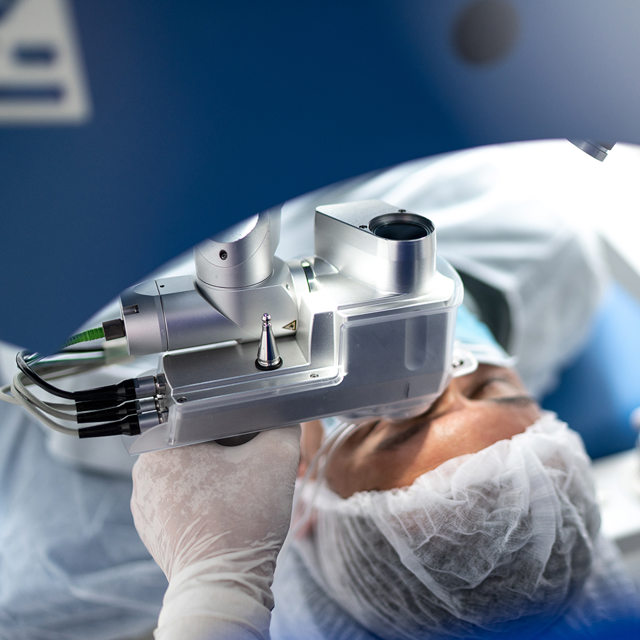
Ophthalmology
Ophthalmology Specialists at Penn Highlands Healthcare
Eyesight is often taken for granted until a problem arises. Ophthalmologists, doctors who specialize in vision care and eye surgery, are dedicated to restoring and preserving your eyesight. They provide comprehensive vision care by diagnosing and treating many different eye disorders and diseases — from cataracts and glaucoma to blocked tear ducts and macular degeneration as well as all other diseases of the eye.
What is the Difference between Ophthalmologists and Optometrists?
An ophthalmologist is either a medical doctor (MD) or a doctor or osteopathic medicine (DO) who has specialized training that enables them to address advanced eye conditions and perform surgery. An optometrist, or doctor of optometry (OD), is an eye care professional who examines, diagnoses and treats disease and conditions of the eye.
Does Penn Highlands Healthcare offer Ophthalmology Services?
Yes, Penn Highlands Healthcare offers ophthalmology services throughout Pennsylvania.
Where does Penn Highlands offer Ophthalmology Services?

Ophthalmology
Penn Highlands Eye Center - ClearfieldA Service of Penn Highlands DuBois
Penn Highlands Eye Center - DuBoisA Service of Penn Highlands DuBois
Penn Highlands Eye Center - St. Marys








Ophthalmology
ClearView Eye Consultants - Duncansville
ClearView Eye Consultants - Tyrone



What Ophthalmology Services does Penn Highlands Healthcare Offer?
The board-certified ophthalmologists at Penn Highlands Healthcare provide highly specialized treatment and surgery to patients with common eye issues ranging from dry eye syndrome to complex diseases of the eye. A sampling of treatments and procedures include:
- Retinal and Glaucoma laser treatments
- Cataract surgery
- Glaucoma
- Optic neuropathy
- Eye muscle problems (eyes turning in/out)
- Droopy eye lids causing decreased visual function
- Eyelid and facial spasms
- Blocked tear ducts
- Eyelid lesions/cysts
- Corneal/conjunctival/eyelid injuries
- Dry eye syndrome
- Eye infections
- Double vision
- Flashes/floaters
- Macular degeneration
- Diabetic eye care
- All diseases of the eye
What is Diabetic Retinopathy?
Diabetic retinopathy is a complication that people with type 1 or type 2 diabetes need to be concerned with while managing their disease. Diabetic retinopathy is a complication caused by damage to the blood vessels in the light-sensitive tissue in the back of the eye called the retina.
Are there Different Types of Diabetic Retinopathy?
Yes, there are two types of diabetic retinopathy.
- Early diabetic retinopathy, often called nonproliferative diabetic retinopathy (NPDR), occurs when the needed new blood vessels do not form at all. When this occurs, nerve fibers throughout the retina and, in particular, the central part of the retina, called the macula, begin to swell. This more severe form requires medical treatment.
- Advanced diabetic retinopathy, often called proliferative diabetic retinopathy, occurs when the blood vessels are damaged and new vessels begin to grow. The abnormal vessels growing in the eye can cause scar tissue and may leak into the vitreous, or fluid that fills the center of the eye. When too much scar tissue builds up, the retina becomes detached from the eye. The leaking blood also may cause too much pressure to build up inside the eye, causing damage to the nerve that carries images from the eye to the brain. The result of this pressure and nerve damage is glaucoma.
What are the Symptoms of Diabetic Retinopathy?
Early symptoms of diabetic retinopathy include seeing floaters, blurriness, dark areas of vision, difficulty perceiving colors.
How is Diabetic Retinopathy Treated?
Those with mild to moderate early diabetic retinopathy may not need treatment. By closely monitoring your eyes, your ophthalmologist can determine when to start treatment for your diabetic retinopathy.
Those with advanced disease may need surgical attention depending on what specifically is occurring with the affected retina.
Several types of laser treatments, called photocoagulation, can shrink the blood vessels in the eye and stop or slow the leakage of blood into the center of the eye. These procedures are done in the ophthalmology office.
A surgical procedure that may be recommended is a vitrectomy. This procedure uses a small incision in the eye to allow the surgeon to remove blood and scar tissue that is causing the symptoms. This procedure is done in a surgery center or hospital and uses general anesthesia.
Does Penn Highlands Healthcare offer Diabetic Retinopathy Surgery?
Yes, the eye surgeons at Penn Highlands Eye Center treat patients with diabetic retinopathy using laser treatments that are done in the ophthalmology office or other procedures done in the hospital.
Where does Penn Highlands Healthcare offer Diabetic Retinopathy Surgery?
Penn Highlands Healthcare offers diabetic retinopathy surgery at Penn Highlands Clearfield, Penn Highlands DuBois and Penn Highlands Elk.
What is Macular Degeneration?
The retina processes all visual images and is responsible for our ability to read, recognize faces, drive and see colors clearly. Macular degeneration causes progressive damage to the central part of the retina (the macula) which is the light-sensitive tissue in the back of the eye, resulting in loss of central vision.
What are the Symptoms of Macular Degeneration?
Symptoms of macular degeneration include:
- Difficulty in reading or doing any activity requiring good vision
- Distortion of lines or other items that may appear wavy or bent
- Difficulty distinguishing faces or anything in your central vision
- Dark patches or empty spaces appear in the center of what you’re seeing •
Macular degeneration can be detected in its very early stage by medical examination of the retina before any visual symptoms occur.
How is Macular Degeneration Treated?
There are several treatment options that can help but there is no cure for macular degeneration. Current treatments focus on preserving as much vision as possible and slowing the progression of the disease. Treatments vary with the stage and type of the disease.
What is Glaucoma?
Glaucoma is a group of diseases that damage the eye’s optic nerve and can cause vision loss and blindness. The most common form of glaucoma is open-angle glaucoma. Open-angle glaucoma occurs as a result of damage to the optic nerve at the back of the eye. In most cases, this is caused by an increased pressure inside the eye, usually due to poor drainage of the fluid inside the eye.
What are the Symptoms of Glaucoma?
In the beginning stages of glaucoma, vision is normal and there are no symptoms or pain. However, as the disease progresses, a person may experience a loss of side or peripheral vision or have tunnel vision. If left undiagnosed and untreated, a complete loss of vision will occur. Symptoms that become apparent as the disease progresses include:
- Blurred vision •
- Noticeable loss of peripheral vision
- Difficulty adjusting to low light conditions
How is Glaucoma Treated?
It is recommended to have regular check-ups by your optometrist or ophthalmologist – one who has the equipment to perform a comprehensive examination that can detect whether there’s any sign of glaucoma. Early treatment for glaucoma can delay further progression of the disease. The most common treatment is with eye drops to help lower eye pressure, although laser treatment and surgery can sometimes be required
Does Penn Highlands Healthcare offer Glaucoma Surgery?
Yes, the eye surgeons at Penn Highlands Eye Center treat thousands of glaucoma patients each year and are highly skilled at the laser and conventional surgeries used to combat the effects of the disease.
Where does Penn Highlands Healthcare offer Glaucoma Surgery?
Penn Highlands Healthcare offers glaucoma surgery at Penn Highlands Clearfield, Penn Highlands DuBois and Penn Highlands Elk.
Do ophthalmologists provide routine, annual eye exams?
Yes, ophthalmologists provide routine eye exams; however their care also includes medical and surgical treatments for eye disorders and conditions.
Do Ophthalmologists Prescribe and Fit people for New Glasses and Contacts?
Yes, ophthalmologists prescribe and fit eyeglasses and contact lenses to correct vision problems. They also provide surgical treatments for eye disorders and conditions.
Are Ophthalmologists’ Services Covered by Insurance?
Most heath care insurance typically covers the cost of care for physical issues with the eye such as infections, cornea disorders glaucoma, cataracts, etc.). It is important to note that vision insurance is needed to cover exams and corrective lenses.

